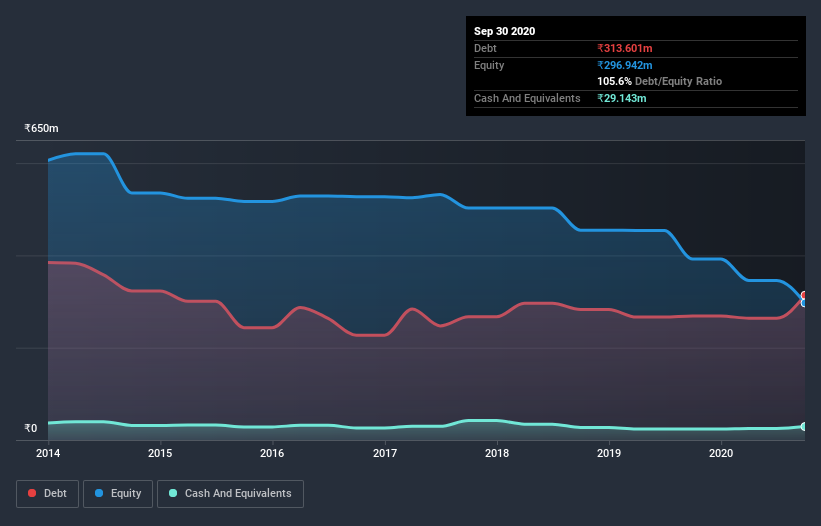Is Pearl Polymers (NSE:PEARLPOLY) Using Debt In A Risky Way?
Howard Marks put it nicely when he said that, rather than worrying about share price volatility, 'The possibility of permanent loss is the risk I worry about... and every practical investor I know worries about.' So it seems the smart money knows that debt - which is usually involved in bankruptcies - is a very important factor, when you assess how risky a company is. We can see that Pearl Polymers Limited (NSE:PEARLPOLY) does use debt in its business. But should shareholders be worried about its use of debt?
When Is Debt Dangerous?
Debt and other liabilities become risky for a business when it cannot easily fulfill those obligations, either with free cash flow or by raising capital at an attractive price. Part and parcel of capitalism is the process of 'creative destruction' where failed businesses are mercilessly liquidated by their bankers. However, a more common (but still painful) scenario is that it has to raise new equity capital at a low price, thus permanently diluting shareholders. Of course, the upside of debt is that it often represents cheap capital, especially when it replaces dilution in a company with the ability to reinvest at high rates of return. The first step when considering a company's debt levels is to consider its cash and debt together.
Check out our latest analysis for Pearl Polymers
What Is Pearl Polymers's Debt?
You can click the graphic below for the historical numbers, but it shows that as of September 2020 Pearl Polymers had ₹313.6m of debt, an increase on ₹268.6m, over one year. However, it does have ₹29.1m in cash offsetting this, leading to net debt of about ₹284.5m.

How Healthy Is Pearl Polymers's Balance Sheet?
We can see from the most recent balance sheet that Pearl Polymers had liabilities of ₹585.3m falling due within a year, and liabilities of ₹89.4m due beyond that. Offsetting these obligations, it had cash of ₹29.1m as well as receivables valued at ₹266.3m due within 12 months. So it has liabilities totalling ₹379.2m more than its cash and near-term receivables, combined.
Given this deficit is actually higher than the company's market capitalization of ₹276.1m, we think shareholders really should watch Pearl Polymers's debt levels, like a parent watching their child ride a bike for the first time. In the scenario where the company had to clean up its balance sheet quickly, it seems likely shareholders would suffer extensive dilution. The balance sheet is clearly the area to focus on when you are analysing debt. But it is Pearl Polymers's earnings that will influence how the balance sheet holds up in the future. So when considering debt, it's definitely worth looking at the earnings trend. Click here for an interactive snapshot.
In the last year Pearl Polymers had a loss before interest and tax, and actually shrunk its revenue by 27%, to ₹1.2b. To be frank that doesn't bode well.
Caveat Emptor
Not only did Pearl Polymers's revenue slip over the last twelve months, but it also produced negative earnings before interest and tax (EBIT). Indeed, it lost a very considerable ₹96m at the EBIT level. When we look at that alongside the significant liabilities, we're not particularly confident about the company. It would need to improve its operations quickly for us to be interested in it. Not least because it burned through ₹1.5m in negative free cash flow over the last year. So suffice it to say we consider the stock to be risky. The balance sheet is clearly the area to focus on when you are analysing debt. However, not all investment risk resides within the balance sheet - far from it. To that end, you should be aware of the 2 warning signs we've spotted with Pearl Polymers .
If you're interested in investing in businesses that can grow profits without the burden of debt, then check out this free list of growing businesses that have net cash on the balance sheet.
If you decide to trade Pearl Polymers, use the lowest-cost* platform that is rated #1 Overall by Barron’s, Interactive Brokers. Trade stocks, options, futures, forex, bonds and funds on 135 markets, all from a single integrated account. Promoted
New: Manage All Your Stock Portfolios in One Place
We've created the ultimate portfolio companion for stock investors, and it's free.
• Connect an unlimited number of Portfolios and see your total in one currency
• Be alerted to new Warning Signs or Risks via email or mobile
• Track the Fair Value of your stocks
This article by Simply Wall St is general in nature. It does not constitute a recommendation to buy or sell any stock, and does not take account of your objectives, or your financial situation. We aim to bring you long-term focused analysis driven by fundamental data. Note that our analysis may not factor in the latest price-sensitive company announcements or qualitative material. Simply Wall St has no position in any stocks mentioned.
*Interactive Brokers Rated Lowest Cost Broker by StockBrokers.com Annual Online Review 2020
Have feedback on this article? Concerned about the content? Get in touch with us directly. Alternatively, email editorial-team@simplywallst.com.
About NSEI:PEARLPOLY
Pearl Polymers
Engages in manufacture and trading of PET bottles, jars, and containers to consumers and industries in India.
Flawless balance sheet with low risk.
Similar Companies
Market Insights
Community Narratives




